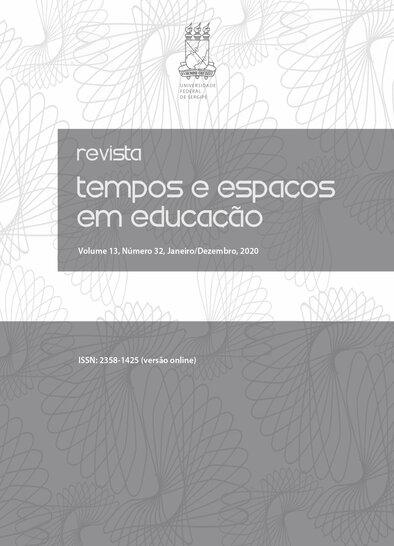Educational systems of Eastern European countries as a subject of international comparative research
DOI:
https://doi.org/10.20952/revtee.v13i32.14068Palavras-chave:
Educational system, Eastern European countries, international comparative studiesResumo
The article analyzes the level of development of educational systems in Eastern European countries by using empirical data from international comparative studies. The tools of comparative analysis are used to group the studied publications, which directly or indirectly consider an educational system at the level of different countries and regions of the world. The newest western approaches to the issue of educational systems are represented. The unsurpassed value of multi-object international comparative research in the study of educational systems of the world enabling the analysis of the phenomenon at the interdisciplinary level is emphasized. The author's definition of “international comparative research” is formulated based on modern scientific studies, which is interpreted as a special type of research, which purpose is to conduct multilevel analysis to compare macro-objects, based on subjective empirical data. Emphasis is done on the lack of a unified terminological apparatus of the studied issue in modern science, which indicates the availability of the following definitive plurality: “comparative studies”, “international issues”, “cross-cultural studies”, and “international comparative studies”. The analysis of the level of development of educational systems of Eastern European countries is based on a comparison of official statistical materials of the World Bank. The processed statistical materials are correlated with the results of descriptive statistics during the testing of statistical hypotheses. Subject analysis of educational systems in Eastern Europe is based on a comparison of empirical data on three criteria – international educational projects, the highest educational results (“S.A.B.E.R”), and the amount of external funding for the educational branch.
Downloads
Referências
Bodnar, S., Mirkovich, I., Koval, V. (2019). Human capital development in Ukrainian education system by means of language integrated teaching. Dilemas contemporaneos-educacion politica y valores, 7 (SI), 14.
Bukanov H., Kolesnyk A., Tashkinova O., Kotlubai V., Koval V. (2019). Social marketing in public administration of social service institutions. Revista Genero & Direito, 8 (6), 457-468.
Dudka, Т., Gurzhii, А., Kartashova, L., Sorochan, Т. & Spitsyna, А. (2020). Social and professional designing of tourist destination management in the professional training of future tourismologists. Revista Turismo Estudos & Práticas, 2, 1-10.
Gawlicz, K. & Starnawski, M. (2018). Educational policies in Central and Eastern Europe: legacies of state socialism, modernization aspirations and challenges of semi-peripheral contexts. Sage Journals, 14, 112-119.
Griffith, S. (2019). Teaching English in Central and Eastern Europe. A Guide to Job Prospects for Teaching English in Central and Eastern Europe, 4, 31-43.
Guglielmi, G. (2019). Eastern European universities score highly in university gender ranking. Nature research, 3, 11-24.
Hansen, J. U. & Young K. (2019). Why It Is Time to Re-Imagine Our Education System. Real Clear Education. Retrieved from https://www.realcleareducation.com.
Kostetska, K., Khumarova, N., Umanska, Y., Shmygol, N., & Koval, V. (2020). Institutional qualities of inclusive environmental management in sustainable economic development. Management Systems in Production Engineering, 28 (2), 15-22. https://doi.org/10.2478/mspe-2020-0003
Koval, V., Polyezhayev, Y., & Bezkhlibna, A. (2018). Communicative competences in enhancing of regional competitiveness in the labour market. Baltic Journal of Economic Studies, 4(5), 105-113. doi:10.30525/2256-0742/2018-4-5-105-113
Kvitka, S., Starushenko, G., Koval, V., Deforzh, H., & Prokopenko, O. (2019). Marketing of Ukrainian higher educational institutions representation based on modeling of Webometrics Ranking. Marketing and Management of Innovations, 3, 60-72. http://doi.org/10.21272/mmi.2019.3-05
Martinez, E. (2020). Pandemic shakes up world’s education systems. Right to Education Initiative, 4, 1-12.
Mineo, L. (2020). Time to fix American education with race-for-space resolve. The Harvard Gazette. Retrieved from https://news.harvard.edu/gazette/story/2020/04/the-pandemics-impact-on-education
Mysíková, М., & Večerník, J. (2019). Returns to Tertiary Education in Western and Eastern Europe. Prague Economic Papers, 1, 30-48.
Nazarova, K., Hordopolov, V., Kopotiienko, T., Miniailo, V., Koval, V., & Diachenko, Y. (2019). Audit in the state economic security system. Management Theory and Studies for Rural Business and Infrastructure Development, 41(3), 419-430.
Osmond-Johnson, P., & Campbell, C. (2018). Transforming an education system through professional learning: developing educational change at scale in Ontario. Educ Res Policy Prac 17, 241-256.
Panić, A., & Lozanov-Crvenković Z. (2019). Analysis of Higher Education Indicators Coherency in Central and Eastern Europe. Business Systems Research Journal, 10 (2), 6-14.
Ralhan, B. D. (2020). Education 2020: Changing The Education System In India. Business world. Retrieved from http://www.businessworld.in/article/Education-2020-Changing-The-Education-System-In-India/14-07-2018-154491.
Rehmat, U. (2020). Education System in Pakistan. Education. Retrieved from https://rehmatblogger.com/education-system-pakistan.
Rodberg, S. (2019). Data Was Supposed to Fix the U.S. Education System. Here’s Why It Hasn’t. Harvard Business Review. Retrieved from https://hbr.org/2019/01/data-was-supposed-to-fix-the-u-s-education-system-heres-why-it-hasnt.
Shmygol N., Galtsova O., Solovyov O., Koval V., Arsawan I. (2020). Analysis of country’s competitiveness factors based on inter-state rating comparisons. E3S Web Conferences, 153, 03001. https://doi.org//10.1051/e3sconf/202015303001
Sonnemann, J. (2019). The top ranking education systems in the world aren't there by accident. Here's how Australia can climb up. News. Retrieved from https://www.abc. net.au /news/2019-12-04/top-ranking-education-systems-in-world-arent-there-by аccident.
Stepaniuk, І. (2019). Inclusive education in Eastern European countries: a current state and future directions. International Journal of Inclusive Education, 23 (3), 328-352.
Szerletics, A., & Rodak, L. (2017). Introduction. Legal Education in Europe. Challenges and Prospects. Oñati Socio-legal Series, 7 (8), 1581-1588.
Ustun, U. & Eryilmaz, А. (2018). Analysis of Finnish Education System to question the reasons behind Finnish success in PISA. Studies in Educational Research and Development, 2 (2), 93-114.
Waslander S., Hooge, E., Theisens, H., & Cissy Р. (2018). Steering in complex education systems. Why similar aims can have dramatically different results. Journal of Education Policy, 35 (2), 12-22.
World Bank (2020). Smart erucation. Retrieved from https://smartereducation.worldbank.org/projects.
Yankovyi O., Koval V., Trokhymets O., Karpenko M., Matskevich Y. (2020). Economic assessment of investment on the basis of production functions. Turismo: Estudos &Práticas, 2.
Downloads
Publicado
Como Citar
Edição
Seção
Licença
À Revista Tempos e Espaços em Educação ficam reservados os direitos autorais pertinentes a todos os artigos nela publicados. A Revista Tempos e Espaços em Educação utiliza a licença https://creativecommons.org/licenses/by/4.0/ (CC BY), que permite o compartilhamento do artigo com o reconhecimento da autoria.



